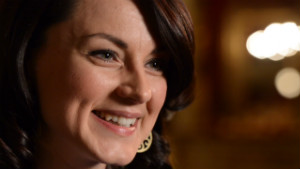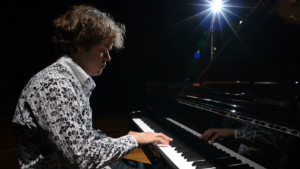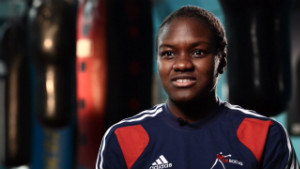- Anita Hartig recently made her debut at La Scala in Milan in the role of Mimi in La Boheme
- Hartig's rise began after she was recommended to director of Vienna State Opera
- Latest in a long line of gifted Romanian opera singers to perform internationally
- Hartig: There are lots of times where I feel depressed or lonely
Editor's note: Anita Hartig, 29, has just debuted at La Scala in Milan in the role of Mimi in Puccini's much-loved La Boheme. The Romanian soprano rose to fame after a critic mentioned her to Ioan Holender when he was the musical director of the Vienna State Opera.
(CNN) -- A friend of mine told me (when) I was 17 years old (that) I should sing opera because I had an interesting voice. I said: "Oh my gosh, No! These fat ladies singing on stage!"
She gave me two Maria Callas CDs, I listened to them and I started to sing the high notes. I started to hear the orchestra and the emotion -- and the power to express so many different feelings through voice, through instruments, through feelings. That was the beginning.
This talent I have got, I had to develop it, because it was a burning flame in my heart.
When it started, I knew. I don't know how to explain it. Maybe different people feel that with love -- you just know it! I felt that with music and opera.
Anita Hartig, opera singer
Virginia Zeani, Ileana Cotrubas, there are so many great Romanian singers, but from my little town in the north, I think I was the first one. I come from Transylvania in the north of Romania. The city I am from is called Bistrita. My parents are very proud of me and so are other people in our little town.
So I worked through the summers so I could get professional singing lessons and then I got into the music academy in Cluj where I studied for six years. When I finished at the music academy, Ioan Holender from the Vienna State Opera heard about me from a critic.
He sent me an email (saying) that he wanted to hear my voice and from that moment on everything changed. I don't know the details about what the critic wrote -- it must have been something that made him curious.
More from Human to Hero: Boxing's first female Olympic gold medalist Nicola Adams
The difference between one singer and another is of, course, the talent he or she got from nature. The color of the voice, yes you could say that, but the most unique thing, the thing that makes a difference, is sincerity. It's not that easy to open yourself to the audience -- to be sincere, to open your soul, to say, "This is me with my talent, my insecurities, with everything I am. This is me."
 Human to Hero: Anita Hartig
Human to Hero: Anita Hartig
Of course, technique is important too, but there are lots of singers with good technique who don't take enough time, maybe, to develop the other part -- the sensitivity.
 Inside the mind of a piano prodigy
Inside the mind of a piano prodigy
My technique is not perfect all the time -- if I am not sleeping enough or having problems and too many thoughts. You can't force your voice to sound the same all the time because lots of exterior things influence your resonance and your energy, and all that feeds into your voice.
 How Nicola Adams punched her way to gold
How Nicola Adams punched her way to gold
The voice is a very sensitive instrument. It's not that easy, it's not just going out there and singing and your voice comes out. It would be so easy if it was like that. Can you imagine how hard it is without a microphone to have the force and the power to sound through an orchestra of 80 people playing loud music? That's not normal, right? You have to be patient and focused and to love what you do and to understand there are lots of moments where you feel very down.
As an opera singer you have to understand that going through those rough moments is part of the lesson, of development, of enrichment. Going through those moments, you can learn to inspire yourself. I inspire myself when I have to interpret a role where the character is very sad or very depressed.
I think what I am doing to project that sound is connecting with something beyond this world. I just take a breath, and try to focus on one point. I can't push the sound out; it feels more like I'm just connecting myself with the universe.
There are lots of times where I feel depressed or lonely or misunderstood and different. I don't have a normal life with family or a partner who can help me from time to time.
More from Human to Hero: Top designer Lydia Maurer shares secret of staying in vogue
Anita Hartig, opera singer
The most interesting thing (is) that we always work with new people -- new conductors, new musicians, new partners -- on a new repertoire or a new role. This is the most beautiful thing that keeps me awake and makes me discover more of myself, to want more.
You can compare being an opera singer with being an athlete: Both have to practice a lot to focus on the distance. I also have to somehow know when I can hold myself back to maintain energy.
Some days I practice three, four, five hours, it depends. Some days I'm just reading, going through the score.
We are in the most beautiful and the most known theater in the world, La Scala in Milan. Great musicians, great tradition -- opera was born here.
I'm so happy to be here, I could cry with gratefulness and joy for the emotions I feel. It's more than a dream -- it's that the most pure desire I had in my heart that came true.